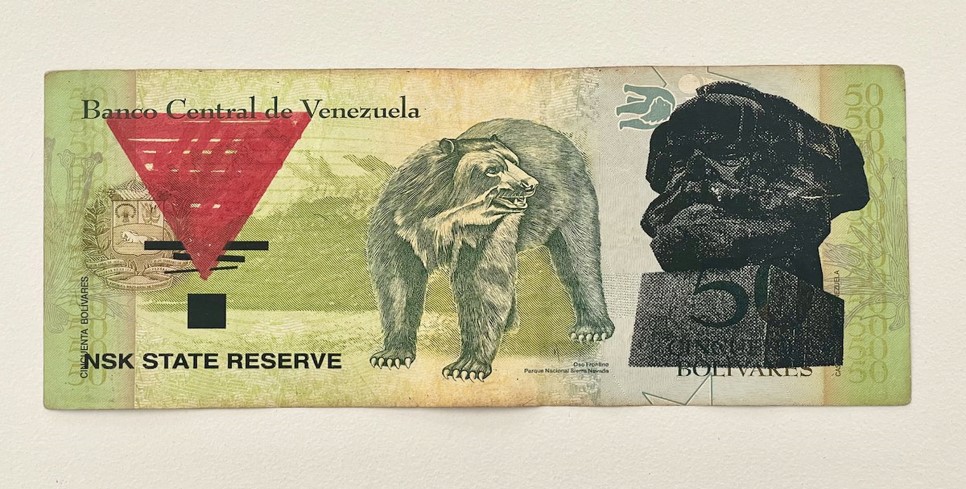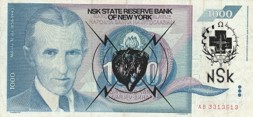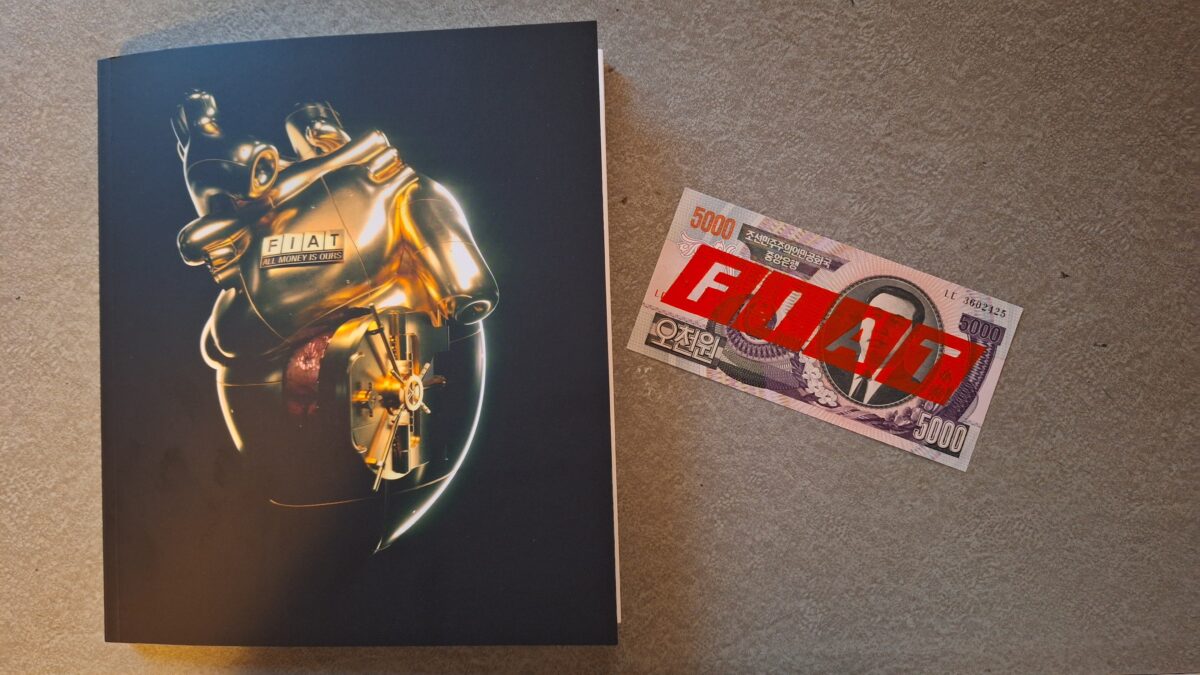Money, which is at the beating heart of global capitalism, is unwrapped in this new book FIAT By NSK State Reserve published by PC-Press. The book documents the history of the “Reserve” as the NSK State’s primary banking unit, and traces the history of NSK State in Slovenia in the 1980s before describing the launch of the NSK State Reserve seven years ago. You’ll need to pay for the glossy coffee-table book which is full of pictures of money, and it gives a different angle on money which is congruent with Marxist analysis while providing some radical art practice steps to shake the ideological hold of this commodity as what Marx called the “universal equivalent.”
Use and Exchange
We usually think of money as being a neutral medium of exchange that emerged in communities progressing from early and apparently primitive bartering of goods to operating in a more civilised sophisticated state. That way of thinking about money is very much in tune with assumptions made by classical political economists in the nineteenth century and with contemporary commonsense. Those commonsensical assumptions are profoundly ideological.

Marxist analysis, in contrast, is dialectical and counter-intuitive, and it takes us into realms that are at moments quite mysterious. Money is a commodity, and Marx comments in Capital that a commodity is “a very queer thing, abounding in metaphysical subtleties and theological niceties;” as soon as an object “steps forth as a commodity,” he says, “it is changed into something transcendent.” Money is a strange commodity that takes on the character of a “universal equivalent.” It is a commodity, something to be bought and sold among all of the other commodities, yet it also stands apart from the other commodities, providing a marker of their value.
Money has now become the “universal equivalent,” a universal equivalent that is in full bloom under globalised capitalism, and it then provokes all manner of socially-functional and dysfunctional fantasies about security and disintegration. We also see it in antisemitic conspiracy theories about finance capital that is felt to be robbing us of our ownership of gold, and that then feeds into some bizarre obsessions with the abandonment of the “Gold Standard.” And money is intrinsically contradictory. While money does indeed link us together, and often seems to be the only thing that links people together under capitalism, it is also, Marx argues, “the universal agent of separation.” It drives people apart.
Marx notes in Capital, a further strange thing about money, that it is the place where “value” appears. Yes, there is value put into objects by human labour, but it is when “surplus value” from our labour is realised when the goods are sold and put into the market as objects of exchange (where they have “exchange value” as opposed to “use value”) that the strange ungraspable “value” that capitalism chases comes into being. It is then bewitching to all of us as it moves in the circuit of capital and capital accumulation. This has implications for how we grasp the nature of each individual commodity; instead of searching for value inside commodities we must go outwards into the social relations that have given them value as objects in circulation, in the circuit.
NSK State
This is where NSK State does something very different and interesting to learn from. They go outwards to question “value,” and disrupt its hold on us. Here we are in the realm of radical art practice to reconfigure money certificates as commodities that subvert rather than speak of the money circuit they are usually part of. What is different about NSK State as a radical art practice is that it also has its origins and carries with it a history as a radical anti-Stalinist political practice.
In 1984 Neue Slowenische Kunst, NSK, was formed in Slovenia, then still part of the Socialist Federal Republic of Yugoslavia. Part of the active punk opposition to the regime, NSK responded to the neoliberal re-capitalisation of the federation in 1991 by forming NSK State, a “State in Time” rather than in a territorial space, with the band Laibach as the “State politicians.” NSK State passports were issued to anyone regardless of place of origin or residence, enabling people to cross borders in Bosnia-Herzegovina and have been sought as entry-vehicles to Europe in Nigeria. The Laibach and NSK State strategy of “overidentification” – knowing yet distanced immersion in the symbolic forms it aimed to subvert – was a form of resistance, first to the old regime and then to the capitalist order. That overidentification sometimes led to accusations that these regimented military-uniformed activists were fascist.

In 2015 NSK State citizens, of which NSK proudly affirms that it has more than that of the Vatican City State, launched NSK State currency. The notes are issued by the NSK State Reserve Bank of New York. NSK State and Laibach typically figure the Malevich Black Cross on their products, and another favourite motif of IRWIN group, who are the NSK “State artists” is the sacred heart which also appears on the notes that are, in Situationist-style, ‘détourned’ from previously-circulating state currencies. The recurring symbol of the sacred heart represents, they say, “the flow of currency through the state, connecting and nourishing it.”
An aim of the currency, according to NSK State, is to promote “non-financial” benefits, the forming of connections between people, and inflation is deliberately leveraged as an “economic mechanism” to facilitate this. To this end, the notes have expiration dates, and the market is flooded with this money. This state, remember, is a “state in time” not territory, and so the speeding up of circulation, something so characteristic of capitalism, is turned against it; so, for NSK State, “every action we take with these bills has this circulatory notion in mind.”
What is intriguing about NSK State and the NSK currency initiatives is that they are not merely radical art practices designed to line the walls of exhibitions, but they are designed to make a difference. They also have an eye to the institutional mechanisms that define identity and segregate populations. It is part of a political project. One thing we might learn from this is the need to find a way to link cultural and political practice; that may involve constructing alternative symbolic spaces.
Bringing money to book
You get this history in the book, and an opening to the kind of cultural-political interventions that are necessary for revolutionaries to build the conditions in which questioning and then dismantling capitalism is commonsense. My copy arrived with an enveloped containing a DPRK note with “FIAT” stamped in red across it, a reminder of the Laibach visit to North Korea in 2015. NSK State were on the side of history when they rebelled against the Stalinist regime in Slovenia, and this book is a reminder that they are still active, still intriguing allies.


